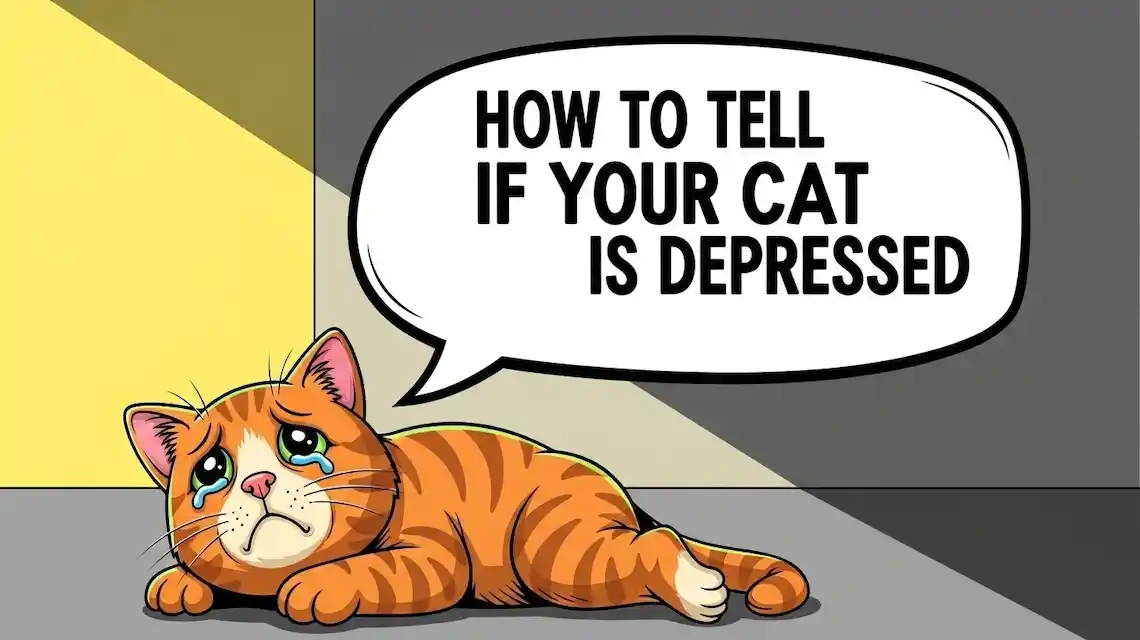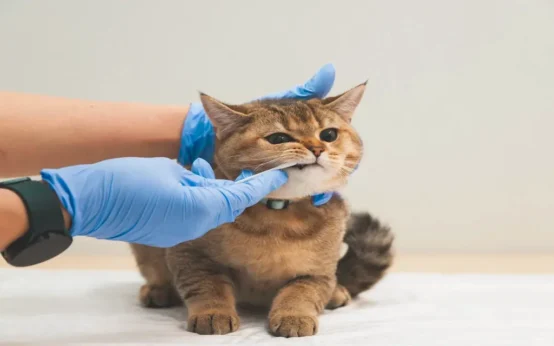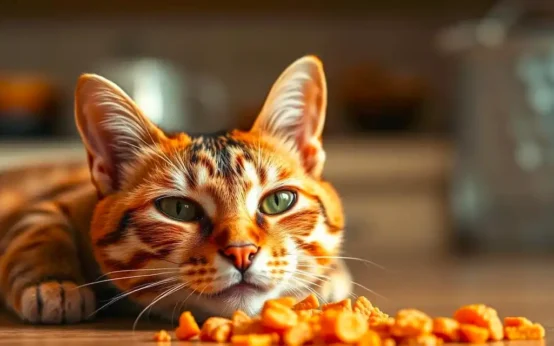Two weeks after Jess moved across town, her easygoing tabby, Milo, changed. He stopped greeting her at the door, hid under the bed, and picked at his food. When his favorite playmate, the neighbor’s cat, stopped visiting, he retreated even more.
So, can cats get depressed? Not in the same way humans do, but they can show clear signs of emotional distress. You might notice extra sleep, less grooming or overgrooming, changes in appetite, fewer play sessions, or new litter box issues.
Big life shifts can trigger this, like a move, a new baby, a different schedule, or the loss of a companion animal. Pain, chronic illness, boredom, and lack of enrichment can add to the problem. Cats crave predictability, and when it vanishes, their mood can slide.
This post will help you spot the signs early, understand common causes, and take simple steps that actually help. You will learn when to call the vet, how to rebuild routine, and what enrichment works. You will also get gentle ways to support a grieving or stressed cat without pushing too hard.
If your cat seems off, you are not imagining it. With the right cues and care, most cats perk up. Keep reading for practical guidance you can use today.
Signs That Your Cat Might Be Depressed
Cats show mood shifts with their bodies and routines. If you are asking can cats get depressed, the short answer is that they can show signs that look a lot like it. Watch for patterns, not one-off bad days. Keep notes for one to two weeks so you can spot trends and share them with your vet.
Here are common signs of cat depression you might see:
- Reduced appetite or erratic eating: Food left in the bowl, or sudden overeating.
- Lethargy: Long naps, slow moves, and short play sessions.
- Hiding: More time under the bed or in closets, less time in common rooms.
- Grooming changes: Matted fur from under-grooming, or bald spots from overgrooming.
- Vocal changes: More meowing or yowling, often at night, or going very quiet.
Track these daily. Note what changed at home, like a move or a schedule shift. Many of these signs overlap with medical issues, so plan a vet check if they last more than a few days.
Changes in Appetite and Weight
A depressed cat may eat less or pick at food, which leads to weight loss. Some cats do the opposite and overeat, then gain weight. Appetite is often the first clue you will notice, since feeding time is so routine.
Practical steps help:
- Measure portions, then record what is eaten each day.
- Weigh your cat weekly with a baby scale, or hold them on your scale and subtract your weight.
- Try quiet, stress-free feeding spots.
If appetite swings last beyond 48 to 72 hours, or you see rapid weight change, call your vet. Pain, dental disease, thyroid problems, and kidney issues can look like mood changes.
Lethargy and Withdrawal from Activities
A once-playful cat may stop chasing toys, skip window watching, and nap most of the day. You might see your cat ignore favorite wand toys, hide when guests arrive, or choose the spare room over the couch.
Offer gentle encouragement:
- Set short, low-pressure play times twice a day.
- Use soft toys and slow movements.
- Reward any interest with praise or a tiny treat.
Do not force play. Pushing too hard can raise stress. If low energy sticks around for a week, book a checkup to rule out pain or illness.
Altered Grooming Habits or Vocalization
Cats that feel low often groom less, which leads to a dull, unkempt coat or dandruff. Others overgroom and cause thin patches, often on the belly or inner legs. Both can be signs of stress or discomfort.
Vocal changes also matter. A quiet cat that starts meowing or yowling more, or a chatty cat that goes silent, may be signaling distress. Sudden night calling can point to anxiety or confusion.
What to do:
- Observe when changes happen and what preceded them.
- Note links to recent events, like a move, a new pet, or a schedule change.
- Share your log with your vet to sort behavior from medical causes.
If grooming or vocal shifts are sudden or severe, seek veterinary advice. Skin disease, pain, hyperthyroidism, and cognitive issues can look like depression.
Common Causes of Depression in Cats
Cats are sensitive to change. They build security from routine, scent, and territory. When that stability shifts, mood can sink. If you have asked can cats get depressed, the short answer is that they can show low mood when their world changes. Common causes of cat depression include the loss of a companion, moving to a new home, adding a new pet, or big schedule changes like night shifts or a new baby. Pain or illness can look the same, so plan a vet visit if symptoms linger.
Picture these real-life triggers:
- A quiet house after a pet passes: Your cat searches and calls, then stops eating.
- A new apartment: Unfamiliar sounds and smells lead to hiding and less play.
- A puppy joins the family: Your cat retreats, grooms less, and avoids shared spaces.
- Shift work begins: Feeding and play times change, and your cat vocalizes at night.
Loss of a Companion or Family Member
Cats can grieve. They may pace and search, wait by doors, or sleep where the companion used to sleep. Appetite often dips, grooming drops, and vocalization can increase. These grief-like behaviors are normal, but they still need support.
Help your cat cope with gentle changes that honor the old bond:
- Offer familiar scents. Place a blanket, bed, or soft item from the lost companion in your cat’s favorite spot.
- Rotate those items slowly over days, then weeks, to avoid a sharp break.
- Keep feeding and play times steady. Predictable care restores confidence.
- Add quiet enrichment, like window perches and soft wand play.
Call your vet if your cat stops eating for 24 hours or more. Health issues can be the real cause, not grief alone.
Major Life Changes Like Moving or New Pets
Moves and new animals reset a cat’s sense of safety. New smells, sounds, and borders can feel like a threat. This often shows up as hiding, reduced appetite, or litter box changes.
Create a calm plan for the transition:
- Set up a safe room with a door, litter box, water, food, bed, and a hiding spot.
- Add vertical space, like shelves or a tall tree, to restore control.
- Use pheromone diffusers to soften stress during the first few weeks.
- For new pets, practice slow introductions. Start with scent swaps, then brief, supervised views at a distance.
Stick to your old routine as much as possible. Small wins, like a short play session or a snack eaten in the open, show your cat that the new setup is safe. If stress signs last more than a week, ask your vet to rule out pain or illness, since both can cause the same behaviors.
How to Help Your Cat Overcome Depression
If you are asking can cats get depressed, the better question is what can you do right now. Helping a depressed cat starts with health, then moves to routine, play, and calm. Small, steady steps work best. Expect progress over weeks, not days.
Visit the Vet for a Full Check-Up
Start with a professional diagnosis. Thyroid disease, dental pain, arthritis, urinary issues, and infections can look like low mood. You need to rule these out before you focus on behavior.
What to expect at the appointment:
- A full history, including recent changes at home and behavior logs.
- A nose-to-tail exam, weight check, dental review, and pain assessment.
- Lab work if needed, such as blood tests and urinalysis.
If your vet finds a medical cause, treatment may include pain relief, diet adjustments, or medication. When stress or anxiety play a role, your vet may suggest anti-anxiety medication, short-term appetite support, or a referral to a behavior expert. Ask for a follow-up plan so you can track results.
Urgent signs to call about fast: not eating for 24 hours, straining in the litter box, rapid breathing, or sudden severe lethargy.
Enrich Your Cat’s Environment and Routine
Once health is checked, build a life your cat can predict. Security comes from routine, choice, and safe places to perch and hide.
Add simple upgrades:
- Vertical space: window perches, shelves, or a tall tree for confidence and control.
- Scratching outlets: sturdy posts in key zones, both vertical and horizontal.
- Pheromone diffusers: plug-ins can lower stress during recovery.
Make play easy and fun:
- Short, twice-daily sessions with wand toys or a laser pointer, ending with a treat or toy the cat can catch.
- Puzzle feeders or scatter feeding to spark hunting instincts.
- A pinch of catnip or silvervine for many cats, used a few times per week.
Lock in consistency:
- Feed at the same times each day. Keep the bowl area quiet.
- Schedule play, grooming, and lights-out. Consistency rebuilds trust.
- Offer a calm safe room during busy times or when guests visit.
Diet tweaks that help:
- Increase moisture with wet food or warm water added to meals.
- Use measured portions and track intake.
- Consider omega-3 supplements only with your vet’s guidance.
When to Consider Professional Help
If signs persist after two to four weeks of home care, bring in a specialist. A veterinary behaviorist or qualified trainer can design a plan that fits your cat and home. Options can include:
- Anti-anxiety medication or supplements guided by your vet.
- Pheromone strategies plus desensitization and counterconditioning.
- Structured play and feeding plans that match your cat’s energy and age.
Act fast if you see worsening appetite, new aggression, litter box refusal, or self-injury from overgrooming. You are not alone in helping a depressed cat. With a vet-first approach, focused enrichment, and patience, most cats turn the corner. Keep notes, celebrate small wins, and stay steady.
Conclusion
Cats can show low mood when life shifts, and the signs are clear. Watch for appetite changes, extra sleep, hiding, grooming issues, and new vocal habits. Track patterns for a week, then call the vet if they persist. Health comes first, since pain or illness can look the same as stress.
Once cleared, focus on steady care. Keep routines tight, set up safe spots, and add short daily play. Offer quiet feeding areas and simple enrichment, like window perches or puzzle feeders. Use gentle rewards to build confidence and spark interest again.
If progress stalls after a few weeks, ask your vet about behavior help. Most cats improve with a calm plan, a predictable schedule, and patient attention. Love and care go a long way, and most cats do bounce back.
Start today by watching your cat closely, writing down changes, and getting help early. Share what you have seen at home, then follow a simple plan you can keep. Your cat’s mood can lift with small, steady steps.
Have you faced this question, can cats get depressed, with your own cat? Share your story or tips in the comments, and let’s help more cats feel safe and bright again.
Cat Depression: FAQs That Actually Help
Can cats get depressed?
Yes. Cats can show low mood and behavior changes that mirror depression. It often follows stress, loss, illness, or big changes at home.
What are common signs of depression in cats?
- Hiding more, less social time
- Sleeping more, or restless sleep
- Eating less, or changes in thirst
- Grooming less, or overgrooming one area
- Playing less, seeming bored
- Quiet voice, or new vocal sounds
- Litter box changes or accidents
- Irritability or clinginess
How do I tell depression from a medical problem?
You cannot be sure without a vet exam. Many illnesses look like mood changes. Pain, thyroid disease, dental issues, kidney disease, and infections can all change behavior. Start with a vet check.
What can cause a cat to feel depressed?
- Loss of a person or pet, grief is real for cats
- Moving home, new baby, new partner, home renovations
- Less play, no window views, no climbing space
- Conflict with another pet, resource competition
- Pain or chronic illness
- Owner absence, sudden routine shifts
How long should I wait before calling the vet?
Call right away if your cat stops eating for 24 hours, or if there is fast weight loss, repeated vomiting, or trouble using the box. For milder signs that last more than one to two weeks, book a visit. Overweight cats risk fatty liver disease after days without food.
What can I do at home to help?
- Keep a steady daily routine for feeding, play, and sleep
- Add two short play sessions daily, 5 to 10 minutes each
- Offer food puzzles and scent or foraging games
- Give safe hiding spots, window views, and vertical space
- Use a calm voice, slow blinking, and gentle petting if welcomed
- Rotate toys to keep them fresh
- Try feline pheromone diffusers, some cats respond well
Do cats grieve after a pet or person dies?
Yes. Signs include searching, calling, sleeping in favored spots, and reduced appetite. Keep routines steady, offer more gentle contact, and give extra play and enrichment. If eating drops or weight falls, see your vet.
Should I get another cat to cheer mine up?
Maybe later. Many cats need time to adjust after a loss. If you add a cat, match energy levels, and introduce slowly, scent first, then sight, then supervised contact. Rushed introductions raise stress.
Can boredom look like depression?
Yes. Lack of play, climbing, and novelty can dull a cat’s mood. Increase daily play, add vertical shelves, rotate toys, and give puzzle feeders. If signs persist, see your vet.
What changes help in a multi-cat home?
- One litter box per cat, plus one extra
- Multiple feeding and water stations
- Separate resting and hiding spots
- Vertical routes so cats can avoid each other
- Short, positive play with each cat daily
- Watch for blocking, staring, or ambush behavior
Are medications ever used?
Yes, for moderate to severe cases under a vet’s care. Vets may use antidepressants like fluoxetine or clomipramine, often with behavior changes and enrichment. Never give human meds to a cat.
Can diet affect mood?
Painful mouths or tummy upset lower appetite and mood. Keep meals tasty and easy to chew if needed. Warm wet food to boost smell. Use puzzle feeders for mental work. Sudden fasting is dangerous, call your vet if that happens.
How can I make the home feel safer?
- Keep noise low in a few “quiet zones”
- Offer covered beds and high perches
- Give consistent, gentle handling
- Place resources so a cat is not trapped in corners
- Use night lights near litter areas for seniors
When will I see improvement?
Some cats perk up within days once pain or stress is fixed. Others need weeks. Track food, play, sleep, and litter habits. Share notes with your vet to guide next steps.
What daily routine works well?
- Morning: feed, short wand-toy play, water refresh
- Midday: puzzle feeder or snuffle mat, window time
- Evening: play session, then meal, then calm petting Small, steady changes beat one big overhaul.




 Dog Trick Training for Beginners
Dog Trick Training for Beginners  Gingivitis Cats Symptoms Every Pet Parent Should Know
Gingivitis Cats Symptoms Every Pet Parent Should Know  How to Make Dog Cookies at Home
How to Make Dog Cookies at Home  Wet Food or Dry Food for Cats?
Wet Food or Dry Food for Cats?  What Is the Healthiest Hamster Breed for Your Home?
What Is the Healthiest Hamster Breed for Your Home?  Cat Food Intolerance Symptoms: How To Spot Them Early
Cat Food Intolerance Symptoms: How To Spot Them Early